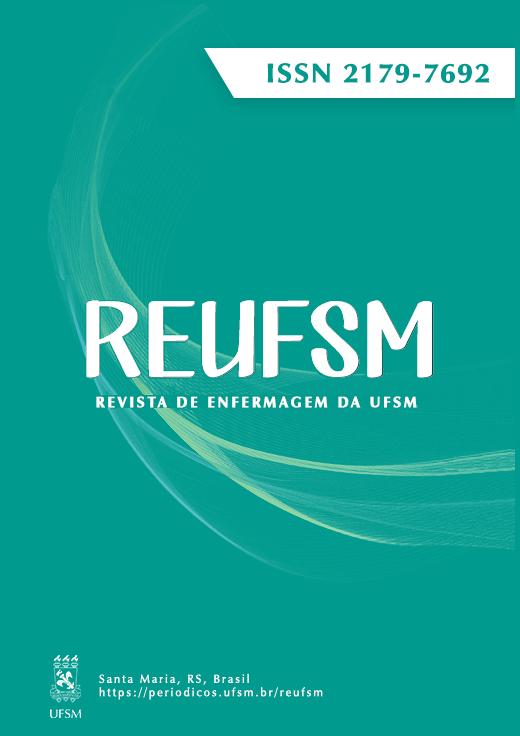Internationalization to increase the production of knowledge in nursing: a reflection study
DOI:
https://doi.org/10.5902/2179769272237Keywords:
Science and Development, Knowledge, Information dissemination, Nursing Research, Education, GraduateAbstract
Objective: reflect on opportunities for the internationalization of nursing in Lusophone countries provided by an international network of nursing knowledge. Method: a reflexive method leading to the modified perception of a given situation leading to new ideas, revealing themes of analysis and proposals for possible solutions through an action plan. This reflection focused on interdisciplinary dialogues, methodological-conceptual innovation, and strengthening of leadership in nursing. Results: the reflection focused on: 1) the dialogue beyond the Lusophone cultural and scientific context for the Network to be recognized as a substantial intellectual partner; 2) the incorporation of multidisciplinary approaches, references, and research designs; and 3) the mobilization of knowledge about social causes to strengthen global nursing leadership in issues of social justice and health equity. Final considerations: Lusophone nursing has expertise to innovate with strategies to strengthen internationalization.
Downloads
References
Prugh K, Prusak L. Designing effective knowledge networks. MIT Sloan Manag Rev [Internet] 2013 [cited 2020 mar 20];55(1):79-88. Retrieved from: https://sloanreview.mit.edu/article/designing-effective-knowledge-networks/
Sanz-Blas S, Buzova D, Pérez-Ruiz P. Building relational worth in an online social community through virtual structural embeddedness and relational embeddedness. Technol Forecast Soc Change. 2021;162:120350. doi: https://doi.org/10.1016/j.techfore.2020.120350
Carper B. Fundamental patterns of knowing in nursing. ANS. 1978;1(1):13–23. doi: https://doi.org/10.1097/00012 272-19781 0000-00004
Thorne S. Rethinking Carper's personal knowing for 21st century nursing. Nurs Philos. 2020; 21:e12307. doi: https://doi.org/10.1111/nup.12307
Zanchetta MS, Medeiros M, Munari DB, Gouveia MTO, Albarracin DGE, Aguilera-Serrano C, Santos WS, Metersky K, Fredericks S, CostaE, He SZ. Environmental scan of resources for the creation of a Nursing Knowledge Network - Summary Report. Toronto Metropolitan University. 63 p. 2022. [cited 2022 Aug 4]. doi: https://doi.org/10.32920/19908994.v1
Castro N, Rovere RLL, Lima AP, Moszkowicz M. Redes de inovação: uma abordagem teórica. Rio de Janeiro, Gesel/UFRJ. 2018. [cited 2022 abr 4]. Available from: fhttps://agora.ie.ufrj.br/pdf/Nivalde_de_Castro/7.TDSE84_2018_Redes_de_inovacao.pdf
Fook J. Developing critical reflection as a research method. In: Higgs J, Titchen A, Horsfall D, Bridges D, editors. Creative spaces for qualitative researching. Springer. 2011. p. 55-64. doi: http://dx.doi.org/10.1007/978-94-6091-761-5_6
Zanchetta MS, Medeiros M, de Carvalho JCM, Baixinho CRSL, Primo CC, Chaves MCRF, Gouveia MTO, Girardon-Perlini NMO, Rocha CMF, CostaE, SantosWS, Pessoa VLMP. Analysis of the particularities of Lusophone participation in a Nursing Knowledge Network. Esc Anna Nery. 2023;27. doi: https://doi.org/10.1590/2177-9465-EAN-2022-0194en
Zanchetta MS, Santos WS, Felipe ICV, Lucchese S. Bold background of nurse-scientist. OBJN. 2018;16(3):238-40. doi: https://doi.org/10.17665/1676-4285.20176144
Harrap N, Doussineau M. Collaboration and networks: EU13 participation in international science. Eur Union [Internet] 2017 [cited 2022 mar 15]:1-5. Available from: https://EconPapers.repec.org/RePEc:ipt:iptwpa:jrc106208
Rodríguez-Martín A, Novalbos Ruiz JP, Jiménez-Rodríguez R, Jiménez-Rodríguez A. Nuevas tecnologías: posibilidades de apoyo a la investigación en red. Nutr Hosp. 2012;27(Suppl 2):49-53. doi: https://dx.doi.org/10.3305/nh.2012.27.sup2.6273
Freire P. Education for critical consciousness. New York: Continuum;1973.
Shor I, Freire P. Medo e Ousadia-O cotidiano do professor. Rio de Janeiro: Paz e Terra; 1986.
International Council on Nurses. Strategic plan [Infographics] [cited 2022 abr 4]. Available from: https://www.icn.ch/sites/default/files/inline-files/Strategic%20plan.pdf
World Health Organization. State of the world’s nursing 2020: investing in education, jobs, and leadership. [cited 2022 abr 4]. Available https://www.who.int/publications/i/item/9789240003279
Richter S, Cummings G, Bernardes A. Sustainable partnerships for global nursing education: a Canadian and Brazilian collaboration. Rev Latino-Am Enfermagem. 2020;28:e3258. doi: http://dx.doi.org/1518-8345.0000-3258
Gallani MCBJ. International collaboration in the Nursing agenda in the coming decades. Rev Latino-Am Enfermagem. 2016;24:e2739. doi: http://dx.doi.org/10.1590/1518-8345.0000.2739
Instituto Brasileiro de Geografia e Estatística (BR). Síntese de indicadores sociais : uma análise das condições de vida da população brasileira: 2021 / IBGE, Coordenação de População e Indicadores Sociais. 203p. [cited 2022 abr 4]. Available from: https://biblioteca.ibge.gov.br/index.php/biblioteca-catalogo?view=detalhes&id=2101892
Rocha CMF, Cassiani SHB. Nursing networks: strategies to strengthen research and extension studies. Rev Gaucha Enferm. 2015;36(2):8-13. doi: 10.1590/1983-1447.2015.02.56420
Opinion Leader. The role of international collaboration and mobility in research. 2017 [acesso em 2022 abr 4]. Available from: https://acmedsci.ac.uk/file-download/96518966
Kraft M, Kastel A, Eriksson H, Hedman AR. Global nursing-a literature review in the field of education and practice. Nurs Open. 2017;4(3):122-33. doi: https://doi.org/10.1002/nop2.79
Rodrigues ML, Nimrichter L, Cordero RJB. The benefits of scientific mobility and international collaboration. FEMS Microbiol Lett. 2016;363(21):fnw247. doi: https://doi.org/10.1093/femsle/fnw247
Lockwood CS. Applying theory informed global trends in a collaborative model for organizational evidence-based healthcare. J Korean Acad Nurs Adm. 2017;23(2):111-7. doi: https://doi.org/10.11111/jkana.2017.23.2.111
Duke VJA, Anstey A, Carter S, Gosse N, Hutchens KM, Marsh JA. Social media in nurse education: utilization and E-professionalism. Nurse Educ Today. 2017;57:8-13. doi: https://doi.org/10.1016/j.nedt.2017.06.009
Published
Versions
- 2023-12-01 (6)
- 2023-06-16 (5)
- 2023-06-01 (4)
- 2023-05-15 (3)
- 2023-04-28 (2)
- 2023-04-27 (1)
How to Cite
Issue
Section
License
Copyright (c) 2023 Revista de Enfermagem da UFSM

This work is licensed under a Creative Commons Attribution-NonCommercial-ShareAlike 4.0 International License.
This work is licensed under a Creative Commons Attribution-NonCommercial-ShareAlike 4.0 International License.








